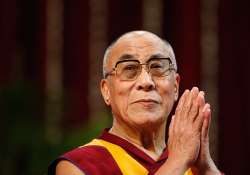China says its role vital in appointing Dalai Lama's successor
Beijing: Hardening its stance on the appointment of the Dalai Lama's successor, China today said it played a “vital role” in the succession as it had officially conferred the title of the 5th Dalai Lama

Beijing: Hardening its stance on the appointment of the Dalai Lama's successor, China today said it played a “vital role” in the succession as it had officially conferred the title of the 5th Dalai Lama in 1653.
“The 14th Dalai Lama has been talking about his reincarnation as though the centuries-old system is his personal matter,” state-run Xinhua news agency said in a commentary questioning the Tibetan's high priest's assertions about his successor.
In a recent interview with the New York Times, the Dalai Lama hinted he would hold some kind of referendum among Tibetan exiles, and consultations among Tibetans within China, on whether a new Dalai Lama should succeed him. The 80-year-old monk told the daily that “the Chinese Communist Party is pretending that they know more about the reincarnation system than Dalai Lama.”
The commentary in Xinhua said: “The authority of the central government has always been important in the reincarnation process. Historical precedents have clearly shown the central government's vital role in the process.”
“The title ‘Dalai Lama' itself, which can be loosely rendered as ‘ocean of wisdom,' was officially conferred on the 5th Dalai Lama by the central Chinese government in 1653.
“Since then, all confirmations of the Dalai Lama have required approval by the central Chinese government, which has deemed the process an important issue concerning sovereignty and national security,” it said.
“For the past nearly 500 years, the Gelug sect has used a consistent reincarnation process. It is through this procedure that the 14th (present) Dalai Lama himself became head monk of the Gelug, or ‘Yellow Hat' school of Tibetan Buddhism,” it said.
As the Dalai Lama is ageing in his exile, China has been asserting it has the main role in appointing his successor in order to firm up its hold on the Tibetan Buddhism's highest spiritual and political forces.
Tibetan's revere the Dalai Lama as the living Buddha. But China regards him as a separatist.The Chinese have ruled Tibet with an iron fist since Communist troops took over the region in 1950. Nine years later, the Dalai Lama fled into exile in India after an abortive uprising against the Chinese rule.